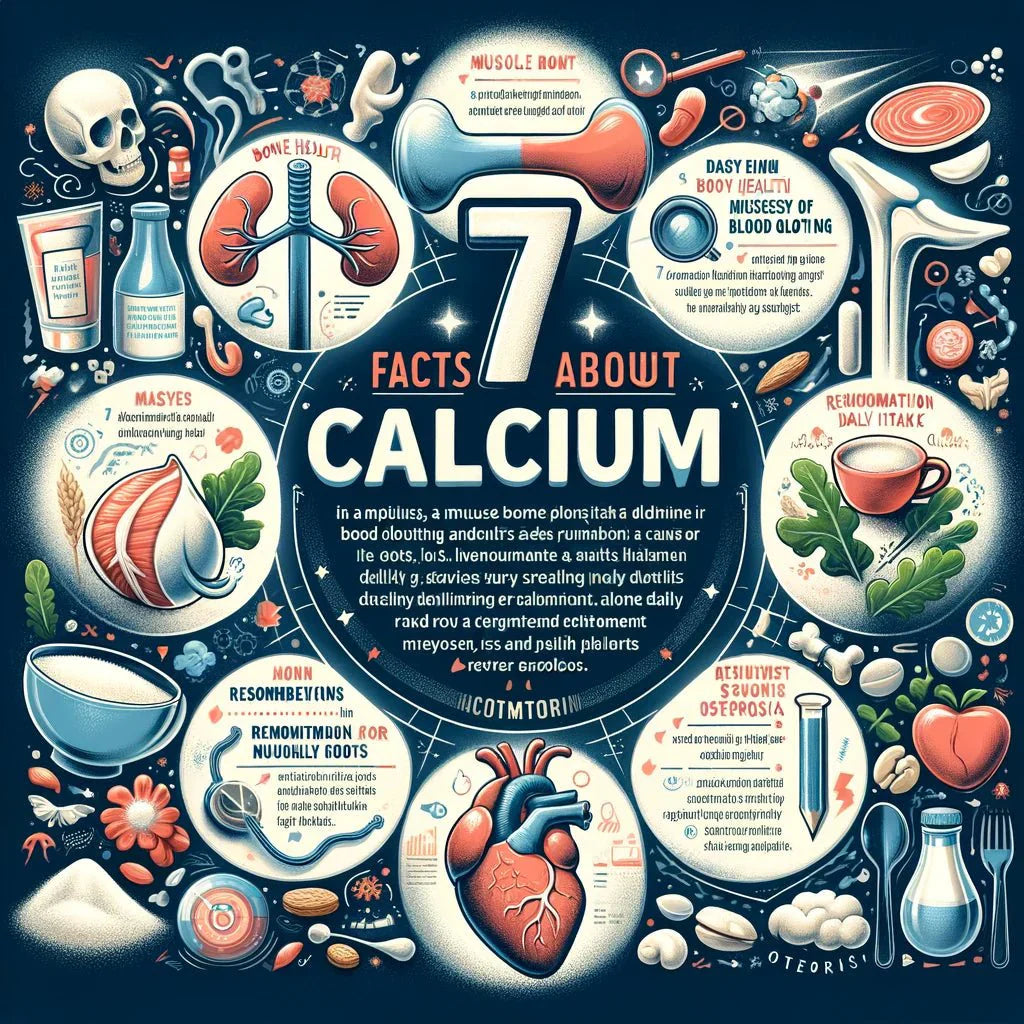
7 Fascinating Facts About Calcium
Share
Calcium Made Simple: Why It Matters, Vitamin D Synergy, Daily Needs, Liquid Options & FAQs
Calcium is essential for bones, muscles, nerves, heart rhythm, and more. Our bodies can’t make calcium, so smart intake (diet + supplements when needed) matters—especially alongside vitamin D for absorption. Below you’ll find the key facts, age-based guidance, and a look at liquid calcium—including NutriNoche Liquid Calcium.
Key Points (7 Fast Facts)
- Calcium is involved in bone strength, muscle contraction/relaxation, nerve signaling, and heart rhythm.
- The body cannot produce calcium—intake comes from food and supplements.
- Vitamin D helps the body absorb calcium; sunshine and diet/supplements contribute to vitamin D status.
- Women (especially during and after menopause) have unique calcium needs.
- Daily needs vary by age; many people prefer simple, easy-to-take formats. (People often choose liquid/nano options for convenience.)
- Low intake over time can contribute to bone-density challenges.
- Supplements can help fill gaps when diet alone falls short—follow label directions and your clinician’s guidance.
1) Why Calcium Matters
Calcium supports strong bones and teeth and also plays roles in normal muscle function, nerve transmission, and heartbeat regulation. Because these processes are constant, consistent intake is important.
2) We Don’t Make Calcium
Calcium is an essential mineral the body can’t synthesize. Food sources (e.g., dairy, fortified plant milks, leafy greens, canned fish with bones) and supplements cover your daily needs.
3) Vitamin D & Calcium Absorption
Vitamin D supports calcium absorption in the gut. Sensible sun exposure, vitamin D–rich foods, or a vitamin D supplement (as advised by a clinician) can help you meet your needs.
4) Women’s Health Considerations
Calcium needs and bone-density concerns often increase during and after menopause. A consistent calcium routine—paired with vitamin D, protein, and weight-bearing activity—supports lifelong skeletal health.
5) Daily Intake by Age
Recommended intakes vary by life stage. Many adults target around 1,000 mg daily; some older adults aim for about 1,200 mg. Choose a format you’ll take consistently. Some people prefer liquids and “nano” style mineral products for everyday practicality and easy mixing.
6) When Intake Is Too Low
Over time, consistently low calcium intake can contribute to bone-density challenges. A food-first approach plus a supplement (if needed) can help maintain your daily baseline.
7) Why Consider Supplements (Liquid/Nano Formats)
Diet alone doesn’t always provide enough calcium each day. Supplements offer a reliable, measured serving. Liquid options fit easily into a routine, and many users like that they’re simple to mix and sip. Always follow the product label and your healthcare professional’s advice.
You were probably taught to drink milk for strong bones. As needs change with age or lifestyle, a thoughtfully chosen calcium supplement can help you stay consistent.
Why Choose NutriNoche Liquid Calcium
- Simple daily routine: Liquid format—easy to take and mix.
- Clean, clear labeling: Practical serving info; follow the directions on the bottle.
- Pairs well with vitamin D: Many users include vitamin D (as advised by their clinician) for overall calcium support.
Top 10 Calcium FAQs
1) What does calcium do besides bone health?
It supports normal muscle contraction, nerve signaling, and heart rhythm, in addition to maintaining bones and teeth.
2) Can my body make calcium on its own?
No. Calcium must come from diet and/or supplements.
3) Why is vitamin D mentioned with calcium so often?
Vitamin D helps your body absorb calcium from the gut. Many people pair them for daily routines.
4) How much calcium do I need per day?
Needs vary by age/sex. Many adults aim for ~1,000 mg; some older adults target ~1,200 mg. Ask your clinician for personal guidance.
5) Is liquid calcium better than tablets?
Formats differ mainly in convenience and preference. Many people like liquids because they’re simple to take and mix consistently.
6) When should I take calcium—morning or night?
Consistency matters most. Choose a time you’ll remember. If you use vitamin D, follow label or clinician advice on timing.
7) Can I take calcium with other minerals (iron, magnesium, zinc)?
Sometimes spacing helps if you notice GI sensitivity or competition. Follow labels and ask your clinician about timing.
8) Is calcium important for women after menopause?
Yes—bone-density concerns rise after menopause. A steady routine that includes calcium and vitamin D can support skeletal health.
9) Can calcium upset my stomach?
Some people are sensitive to certain forms or large single servings. Taking smaller amounts with food may help; ask your clinician if issues persist.
10) Where can I buy NutriNoche Liquid Calcium?
Visit: https://nutrinoche.com/collections/all-products/products/nutrinoche-liquid-calcium-mineral-supplement for details and availability.











